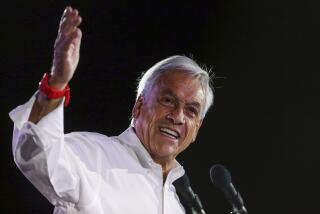Chilean Prosperity Came After the Pinochet Regime
- Share via
What’s the reality behind the Chilean “model” imposed by the repressive regime of Gen. Augusto Pinochet, and extolled by columnist James Flanigan [“Pinochet Aside, Chile’s Reforms Launched a New Era,” March 15]?
How were “deregulation, privatization and freeing of prices from government control” achieved? What were the costs in human lives and suffering? Who benefited?
Pinochet and his comrades-in-arms came to power in the bloodiest coup--with CIA connivance--in the West since World War II. They bombed and strafed their own White House, murdered their nation’s constitutional president and over 90 of their fellow officers loyal to democracy, and killed or “disappeared” nearly 20,000 citizens, many of them workers who sat down in the factories in defiance of the military.
The military and police involved in the coup rounded up and imprisoned members of Congress, party officials, union leaders, students, reporters and countless others who were suspect. The new regime abolished parties and unions, forcibly dissolved Congress, tore up the democratic constitution and, in a word, destroyed one of the most vital and durable constitutional democracies in the world.
In its stead, Pinochet and his comrades consolidated a brutal, repressive regime, which carried out unconstrained human rights abuses throughout its 17 years in power and dismantled one of the most comprehensive and progressive social welfare structures on the continent.
Only this, the awesome power unleashed against its own population, not Flanigan’s “awesome power of ideas,” made it possible to impose “reforms” in accord with the “open market concepts” that Flanigan applauds.
What did these reforms achieve? Even by the usual numbers, the regime and its “Chicago boys” were a failure. Gross national income per capita, according to the World Bank, was $1,660 in 1973, the year of the coup, and it dropped steadily for the next dozen years, barely recovering to the same level, or $1,680, in constant 1987 dollars, as of 1988, the year Pinochet was overwhelmingly rejected in a national plebiscite. Only after the freely elected president took office did these figures rise significantly.
This is the reality behind the model of “economic freedom” Flanigan advocates. God save us and the countries in Latin America and Asia to which he wants to apply this “prescription”--which, he assures us, has already “contributed to the sky-high U.S. bull market.”
Prof. MAURICE ZEITLIN
UCLA
*
In 1976, my father, Orlando Letelier, was assassinated on the streets of Washington, D.C., by a car bomb planted by a Chilean hit squad acting under orders from Pinochet and Manuel Contreras (Pinochet’s second in command and head of the DINA, the Chilean intelligence agency). Along with Orlando, an American colleague, Ronnie Karpen Moffitt, died in the brutal terrorist act.
Barely a month before his death, Orlando’s article, “Chile: Economic ‘Freedom’ and Political Repression,” was published in the Nation.
Now a classic, the article showed how political repression and economic policies were closely linked. Even so, economists from the U.S., the “Chicago boys,” who were then guiding Chile’s economic policies, disclaimed responsibility for the Junta’s repression.
Chileans won a small victory when Contreras was found guilty of ordering the murders and sentenced to jail, yet in the minds and hearts of the majority of Chileans this event fell way short of addressing the needs of justice.
To most it is patently clear that Pinochet was the intellectual author of this and many other crimes against innocent individuals.
Mr. Flanigan might have done well to speak with a few more Chileans before reaching conclusions that have little to do with actual historical events and more profoundly with the legacy we have inherited from the military regime.
It is fair to say that my country, in spite of Pinochet, was able to set into motion economic maneuvers that may have contributed to its present apparent prosperity.
It is also clear that the greatest advances in the economy have occurred since 1990, when Chileans voted out the military and voted in the coalition government of Christian Democrat Patricio Aylwin.
While the economy shows great signs of health, in Chile we do not yet have in place the environmental regulations or social controls which would delay the destruction of that which we have built our national industries, cultures and economies upon.
How unfortunate that there are those who argue that these losses are the price a nation pays for prosperity.
FRANCISCO LETELIER
Venice
More to Read
Sign up for Essential California
The most important California stories and recommendations in your inbox every morning.
You may occasionally receive promotional content from the Los Angeles Times.










